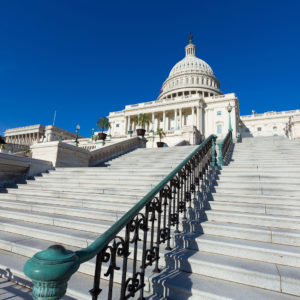As the United States has grown from thirteen free and independent states to a superpower spanning an entire continent, its government has grown too. While reformers have periodically tried to roll back the tide of bureaucracy, the fight has often been bitterly partisan and largely unsuccessful. This makes it somewhat surprising that a bill to limit the authority of metropolitan planning organizations has received overwhelming bipartisan support. The bill, recently introduced by Reps. Daniel Lipinski, D-Ill., and Jason Lewis, R-Minn., and eleven other original co-sponsors (now up to 28), would roll back an Obama-era regulation that dramatically expanded the area overseen by metropolitan planning councils.
Metropolitan planning councils have existed since 1962, when they were introduced as part of the Federal-Aid Highway Act. The law required that a metropolitan planning council be formed for any urbanized area with a population of over 50,000 people. Federal funding for transportation projects and other programs could then be funneled through these organizations, allowing for the planning of infrastructure projects such as roads, sewers, and waterworks that passed through multiple municipalities.
Although metropolitan planning councils had little authority during the first decades of their existence, their authority expanded in the 1990s after the passage of Intermodal Surface Transportation Efficiency Act, which directed federal transportation funding to metropolitan planning councils and increased their role in transportation planning. In December 2016, the Obama administration expanded their authority even further by requiring that the council maps be redrawn to include “an entire urbanized area and the contiguous area expected to become urbanized within a 20-year forecast period.”
Today more than 400 metropolitan planning councils exist around the country. The new rule dramatically expanded the areas overseen by these councils and raised the possibility that metropolitan planning councils could merge or even extend their jurisdictions across state lines.
The issue is a familiar one for Lewis, a former Minneapolis talk radio host who had frequently criticized Minnesota’s Met Council during his time on air. Although the issue has local impact, he acknowledges that it touches many more states.
“I do think there is an issue with the Met council and its unelected nature,” says Lewis, who described the council as “usurping power” since its development in the 1970s.
“Now it gets revenue from the state, it has tax revenue from the metro county tax that was just enacted,” he continued. “It consumes a whole lot of revenue from property taxes. It controls development; it controls transportation. It controls…infrastructure on sewer and water and no one other than the gubernatorial appointment has a say on the matter.”
The issue is of local concern for Lewis, who represents the southern Minneapolis metro area. However, he quickly admits that the problem is much broader.
“It is easy to get parochial and think that the Met Council is the only one that people have issues with, but [metropolitan planning councils] are happening all over,” says Lewis. “They are happening all around. They are merging, becoming bigger. Some are elected and some aren’t.”
Lewis told InsideSources that these councils have grown from area planning bodies to councils that exercise an increasing amount of authority over transportation planning without necessarily being directly elected. States differ in how they selected members of their metropolitan planning councils, but many allow them to be appointed directly by the governor.
This makes them less accountable to voters for the decisions they make, argue opponents of the metropolitan planning council structure.
“If the Met Council met an explicit federal requirement that elected officials sit on the Council and the Council were truly just a planning body, this expansion of MPO boundaries might be slightly less alarming, but the Met Council’s unique and unaccountable governance structure (all members appointed by governor) has been ‘grandfathered’ for years,” writes Kim Crockett, vice president and senior policy fellow at Minnesota’s Center of the American Experiment.
Unlike many governmental bodies, metropolitan planning councils have few defenders. Lewis says that many other representatives, particularly those from the Northeast, agree that the authority of these councils needs to be reigned in.
“The specter of a regional government transcending state boundaries but having control [over development] really bothers people in the northeast because the borders are so close and the states are so small,” says Lewis.
Further west, some municipalities fear that the Obama rule would allow metropolitan planning council authority to expand into areas presently outside of the metropolitan area which the council believes could become part of the area given development projects for the next twenty years. In Lewis’s home state of Minnesota, this could expand the area the council oversees to include seven counties, including some more than 25 miles from downtown Minneapolis.
The proposed bill does not do away with metropolitan planning organizations altogether, but instead removes federal impediments to state legislatures voting to limit their authority.
“We aren’t quite sure why the federal government stepped in on this issue,” says Lewis, “but we wanted to knock down this barrier and return the authority to the states.”
Thus far, the bill’s chances of success seem strong. It easily passed out of committee on a voice vote and awaits being added to the schedule for a hearing on the House floor. Lewis hopes that this means that it will coast to an easy passage.


